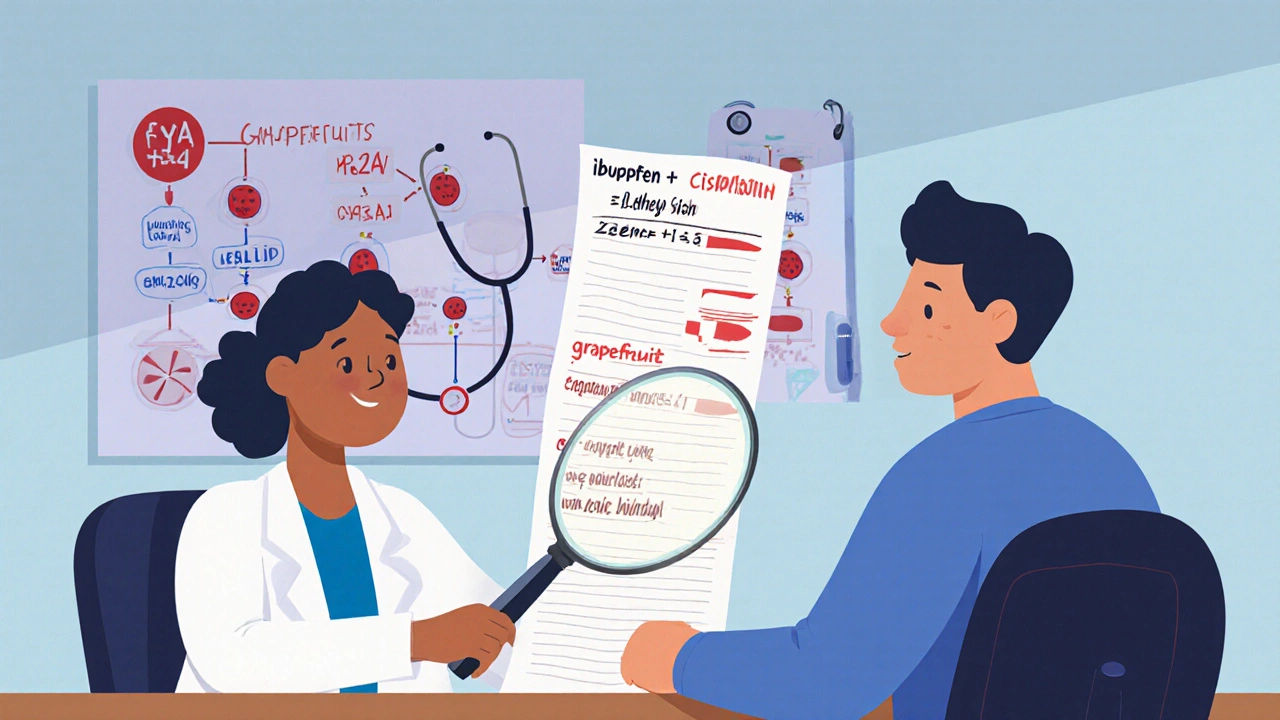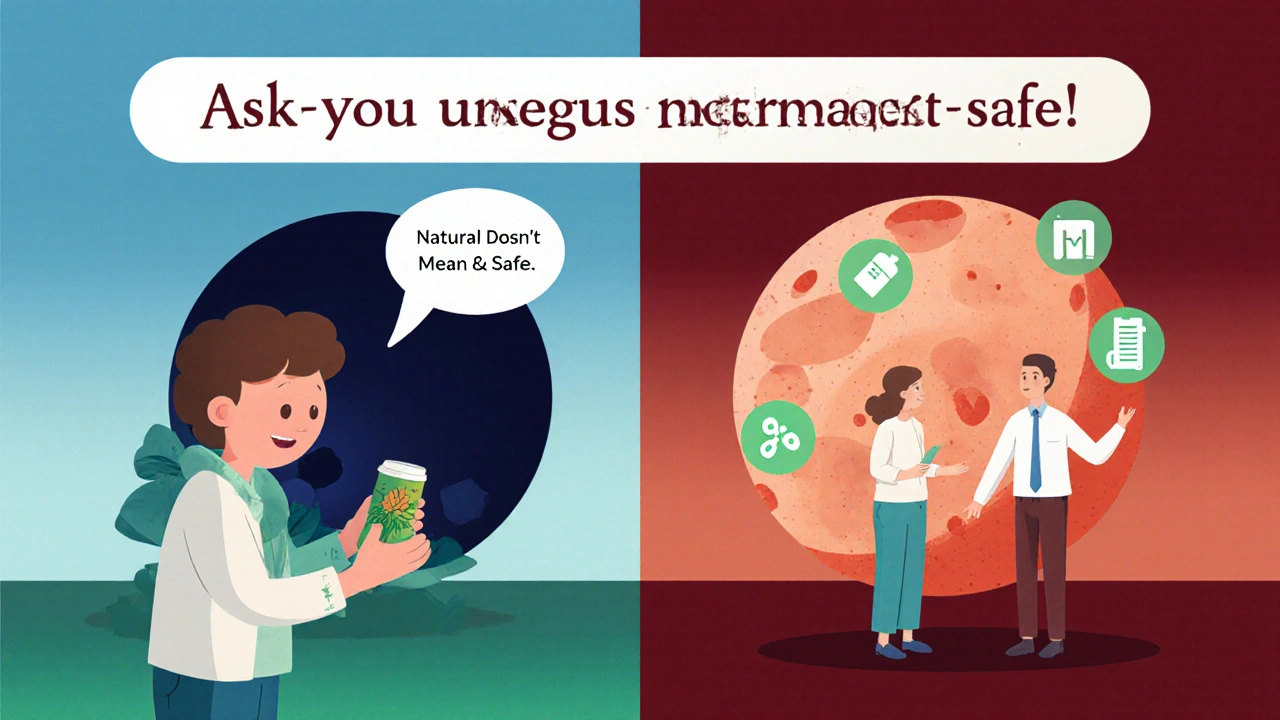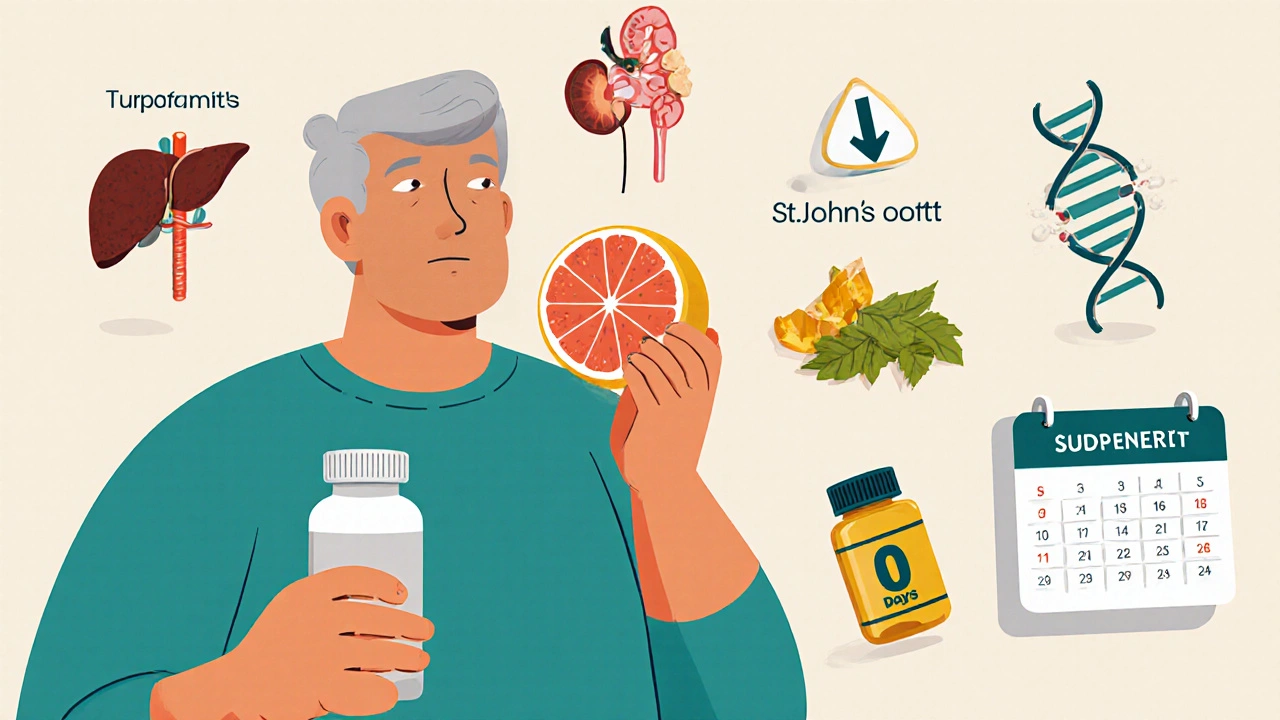What You Need to Know About Chemotherapy Drug Interactions
When you're undergoing chemotherapy, every pill, supplement, or even a grapefruit can change how your treatment works. It’s not just about the cancer drug itself-it’s what else is in your system. About 40% of cancer patients experience potential drug interactions with their chemotherapy, and more than half of those on oral chemo have at least one interaction that could be dangerous. Some of these interactions can lead to treatment failure, severe side effects, or even death. This isn’t theoretical-it’s happening right now in clinics and homes across the country.
Why Chemotherapy Interactions Are So Dangerous
Chemotherapy drugs are powerful. They’re designed to kill fast-growing cells-cancer cells. But they don’t always know the difference. When another drug or supplement enters the mix, it can change how your body processes the chemo. This can make the drug too strong, too weak, or cause unexpected damage to your liver, kidneys, or heart.
The most common type of interaction is metabolic. It happens through the cytochrome P450 enzyme system in your liver-your body’s main drug-processing factory. About 70% of all prescription drugs rely on this system. When two drugs compete for the same enzyme, one can slow down or speed up the other. For example, if you’re taking docetaxel and also use grapefruit juice, the grapefruit blocks the enzyme that breaks down docetaxel. That means more chemo stays in your blood longer, increasing your risk of nerve damage, low blood counts, or even hospitalization.
Other interactions are pharmacodynamic. That means two drugs work together in ways that amplify side effects. Take cisplatin and aminoglycoside antibiotics-both are toxic to the kidneys. Together, they can cause sudden kidney failure. Or consider paclitaxel and ibuprofen. Both thin the blood. Add them together during chemo, and your risk of internal bleeding goes up dramatically.
Oral Chemo Is Changing the Game
Twenty years ago, most chemotherapy was given in a hospital through an IV. Now, 25% of chemotherapy drugs in development are oral-pills or capsules you take at home. That sounds convenient, but it’s made interactions way harder to control. You’re not under a nurse’s watch anymore. You might forget to tell your oncologist you started taking turmeric for arthritis, or you’re drinking green tea every morning because you heard it’s healthy.
Oral chemo drugs like capecitabine, temozolomide, and erlotinib are absorbed through your gut, and that’s where food and supplements interfere. A single dose of St. John’s wort, a common herbal antidepressant, can slash the effectiveness of irinotecan by up to 40%. That means your tumor might keep growing while you think the treatment is working.
Supplements Are Not Safe Just Because They’re Natural
"Natural" doesn’t mean harmless. In fact, the FDA doesn’t regulate supplements the same way it does prescription drugs. A 2023 review from the VA Whole Health Library found that many supplements contain unlisted ingredients, wrong dosages, or even contaminants. And in cancer patients, some of these can be deadly.
Here’s what you need to avoid during chemo:
- Garlic, ginger, ginkgo biloba - increase bleeding risk, especially if you’re on blood thinners or having surgery
- St. John’s wort - reduces effectiveness of many chemo drugs by speeding up their breakdown
- Green tea extract - can interfere with bortezomib, a drug used for multiple myeloma
- Resveratrol, turmeric, vitamin E - may protect cancer cells from chemo damage instead of helping kill them
- Black cohosh, dong quai, licorice - can affect hormone-sensitive cancers like breast or prostate cancer
Even something as simple as fish oil can be risky. One study found that patients taking fish oil while on oxaliplatin had worse nerve damage than those who didn’t. No one warned them it could happen.

Immunotherapy Adds a Whole New Layer of Risk
Checkpoint inhibitors like pembrolizumab and nivolumab have revolutionized cancer treatment. But they work by turning your immune system loose on cancer. And that’s where things get unpredictable.
When you take an immune checkpoint inhibitor and also use a drug that affects your immune system-like prednisone, methotrexate, or even some antibiotics-your body can overreact. You might develop severe liver damage, skin rashes, or even a rare but life-threatening condition called toxic epidermal necrolysis. These reactions didn’t happen with older chemo drugs. They’re new, poorly understood, and often missed by standard interaction checkers.
A 2024 study in ACS Chemical Research in Toxicology found that patients on immunotherapy who also took NSAIDs (like ibuprofen or naproxen) had higher rates of immune-related side effects. Doctors didn’t expect this. The drug labels didn’t warn about it. But the data was there.
Age, Other Medications, and Your Body’s Changes
Most cancer patients are over 65. And with age comes more medications-for blood pressure, diabetes, arthritis, depression. The average elderly cancer patient takes seven different drugs. That’s a recipe for interaction.
As you age, your liver and kidneys don’t work as well. Your body holds onto drugs longer. A dose that was safe at 50 can become toxic at 75. A 2014 study of 244 patients over 70 found that 75% had potential for serious drug interactions with their chemotherapy. Many of them were on antidepressants. And here’s the twist: tamoxifen, a common breast cancer drug, loses its power when taken with certain SSRIs like paroxetine or fluoxetine. One in eight women in the U.S. gets breast cancer. One in eight takes an antidepressant. That’s a dangerous overlap.
What You Should Do to Stay Safe
Here’s the reality: You can’t avoid all risks. But you can control the big ones.
- Make a complete list of everything you take. Not just prescriptions. Include vitamins, herbal teas, CBD oil, probiotics, and even over-the-counter painkillers. Write it down. Update it every time you start or stop something.
- Bring this list to every appointment. Don’t assume your oncologist knows. Even if you’ve been seeing them for years, new drugs get added. Supplements get dropped. Your pharmacist needs to see it too.
- Ask: "Is this safe with my chemo?" Before taking anything new-even a new brand of multivitamin-ask your oncology pharmacist. Not your general pharmacist. Oncology pharmacists specialize in cancer drug interactions. They use tools like Lexicomp and Micromedex that flag risks specific to chemotherapy.
- Avoid grapefruit, Seville oranges, and pomelos. These fruits block the CYP3A4 enzyme, which handles more than half of oral chemo drugs. Even one glass of juice can cause problems that last days.
- Stop supplements 10 days before surgery. If you’re having a procedure, your care team needs to know what you’re taking. Bleeding risks from supplements like garlic or ginkgo can delay surgery or cause complications.
- Don’t self-medicate for side effects. Nausea? Ask for a prescription anti-nausea drug. Pain? Talk to your doctor before grabbing ibuprofen. Fatigue? Don’t reach for energy supplements-they can interfere with your treatment.

When to Call Your Care Team Immediately
Some reactions need urgent attention. If you experience any of these while on chemotherapy, call your oncology team right away:
- Sudden skin rash, blistering, or peeling
- Unexplained fever, chills, or night sweats
- Yellowing of skin or eyes
- Severe diarrhea or vomiting that won’t stop
- Bleeding from gums, nose, or in stool
- Confusion, dizziness, or fainting
These aren’t normal side effects. They could be signs of a dangerous interaction.
The Bottom Line
Chemotherapy is complex. But you don’t have to navigate it alone. The biggest mistake patients make is thinking that if something is "natural" or "over-the-counter," it’s safe with cancer treatment. That’s not true. The same drugs that help you sleep, reduce pain, or lower cholesterol can make your chemo less effective-or more toxic.
Your care team can’t help you if they don’t know what you’re taking. Be honest. Be thorough. Keep your list updated. And when in doubt, ask your oncology pharmacist. They’re trained to spot the hidden dangers. And in cancer treatment, those hidden dangers can mean the difference between life and death.
Can I take over-the-counter painkillers like ibuprofen while on chemotherapy?
It depends. Ibuprofen and other NSAIDs can increase bleeding risk, especially if you’re on chemo drugs that lower platelets or if you’re also taking blood thinners. They can also worsen kidney damage when combined with cisplatin or other nephrotoxic drugs. Always check with your oncology team before taking any OTC pain reliever. Acetaminophen (Tylenol) is often safer, but even that can affect liver function if you’re on certain oral chemotherapies.
Is it safe to take vitamins or supplements during chemotherapy?
Most oncologists advise against taking high-dose antioxidant supplements like vitamin C, E, or selenium during active chemo or radiation. These can interfere with how the drugs kill cancer cells. Even common ones like fish oil, turmeric, or ginseng can alter drug metabolism or increase bleeding risk. Some supplements are fine in small amounts-like a daily multivitamin without extra antioxidants-but always get approval from your oncology pharmacist first.
Why does grapefruit affect chemotherapy drugs?
Grapefruit contains compounds called furanocoumarins that permanently block the CYP3A4 enzyme in your liver and gut. This enzyme breaks down more than half of oral chemotherapy drugs, including docetaxel, erlotinib, and sunitinib. When it’s blocked, the drug builds up in your blood, increasing side effects like nerve damage, low blood counts, or organ toxicity. Even a single glass of grapefruit juice can have effects that last 24-72 hours. Avoid it completely during treatment.
Can herbal remedies like turmeric or ginger help with chemo side effects?
While turmeric and ginger have anti-inflammatory properties, there’s no strong evidence they reduce chemo side effects safely. In fact, turmeric may protect cancer cells from chemo damage, and ginger can increase bleeding risk if you’re on blood thinners or have low platelets. Some patients report feeling better, but the risk isn’t worth it without medical supervision. Always talk to your oncology team before using any herbal remedy.
What should I do if I accidentally took something that might interact with my chemo?
Don’t panic, but act fast. Call your oncology clinic or pharmacist immediately. Tell them exactly what you took, how much, and when. They can check if it’s a major interaction and whether you need monitoring, blood tests, or a dose adjustment. Never wait to see if you feel worse. Early intervention can prevent serious complications.
Do all cancer drugs have the same interaction risks?
No. Older chemo drugs like cyclophosphamide or doxorubicin have well-documented interaction profiles. Newer targeted therapies and immunotherapies like pembrolizumab or osimertinib have fewer known interactions-but they’re more unpredictable. Immunotherapies can cause unique immune-related side effects when combined with other drugs, and those risks aren’t always listed on labels. Always assume any new medication could interact, no matter how new or advanced the chemo is.
How often should I review my medications with my oncology team?
At every visit-especially when you start a new treatment, change doses, or get a new prescription. Even if nothing seems to have changed, your body’s metabolism can shift over time. Many patients don’t realize they’ve started taking something new until they’re asked directly. Keep your list updated and bring it to every appointment. It’s the simplest way to prevent a dangerous interaction.
Next Steps
If you’re on chemotherapy, start today by making a complete list of every medication, supplement, and herbal product you take. Include dosages and how often you take them. Then, schedule a time to speak with your oncology pharmacist. Most cancer centers have one on staff-ask your nurse for an appointment. Don’t wait for a problem to happen. Prevention is the best defense.
And if you’re caring for someone on chemo, help them keep track. Write down questions before appointments. Remind them to speak up about anything new they’ve started. In cancer treatment, the smallest detail can make the biggest difference.


Andrew Cairney
I swear this whole chemo thing is just Big Pharma’s way to keep us scared and buying pills. I read on a forum that grapefruit juice actually helps flush out toxins and the FDA just hates it because it’s free. My cousin took it with her treatment and her tumors shrunk-no docs wanted to talk about it. 😒
Matt Wells
The assertion that 40% of cancer patients experience clinically significant drug interactions is statistically misleading without citation of the source population or methodological rigor. Furthermore, the conflation of pharmacokinetic and pharmacodynamic interactions, while not incorrect, lacks the precision necessary for clinical communication. The omission of CYP isoform specificity (e.g., CYP3A4 vs. CYP2D6) in the discussion of grapefruit juice is a notable deficiency.
jalyssa chea
stop lying to people about supplements theyve been using for years and now you say its dangerous what about all the people who cured their cancer with turmeric and no chemo at all i mean really
Gary Lam
So let me get this straight-you’re telling me I can’t have my morning green smoothie with ginger and turmeric because some lab study says it might ‘protect cancer cells’? Bro, I’ve been drinking this since 2018 and my PSA is lower than my ex’s text response rate. Maybe the real danger is doctors who don’t listen to patients? 🤷♂️
Julie Roe
I just want to say thank you for writing this. My mom was on oral chemo and started taking melatonin for sleep-no one told her it could mess with her tamoxifen. She ended up in the ER with a weird rash and they only caught it because her oncology pharmacist asked the right question. I wish every patient had access to someone who actually knows how these drugs play together. Please, if you’re on chemo, make that appointment with the oncology pharmacist. They’re the unsung heroes. And no, your Walmart pharmacist doesn’t have the same tools. Seriously.
Peter Stephen .O
Y’all are overcomplicating this. You got chemo? Don’t touch anything that ain’t prescribed. No ‘natural’ crap. No ‘I read on Reddit’ stuff. No ‘my aunt’s friend’s dog’s vet said…’ nonsense. Your body’s already fighting a war. Don’t send in rogue troops. Stick to the mission. If you want to feel better, sleep. Drink water. Eat veggies. And if you’re tempted to pop that ‘immune booster’? Just say no. Your oncology team didn’t get into this field to play guesswork. They’re trying to save your life-not your Instagram wellness aesthetic.
Joyce Genon
Look, I get the intent, but this reads like a fear-mongering brochure written by a pharmaceutical rep with a thesaurus. The entire piece assumes patients are dumb enough to take random supplements without consulting anyone-which is frankly insulting. Most of us are hyper-vigilant. We’ve Googled every possible interaction, joined five support groups, and printed out three different charts. The real problem? Doctors who don’t ask. Pharmacists who don’t follow up. And hospitals that still use paper forms from 1997. This article blames the patient for a system that’s broken. And the fact that they didn’t mention drug pricing as a factor in non-adherence? That’s the real elephant in the room.
Ashley Unknown
I’ve been on chemo for three years and I’ve taken every supplement under the sun-CBD, ashwagandha, colostrum, even that weird mushroom powder from the guy at the farmers market who said it’s ‘quantum-activated.’ I’ve had zero side effects, my tumors are stable, and my oncologist hasn’t fired me yet. You know what I think? That 40% statistic is just there to scare people into staying on expensive meds. I’ve met people who stopped chemo and used cannabis oil and they’re alive today. Why isn’t that in the article? Why isn’t anyone talking about the fact that the FDA banned CBD research for 70 years? This isn’t medicine-it’s control. And I’m not playing. I’m not stopping my mushrooms. I’m not giving up my grapefruit. I’m not letting them scare me into silence. If I die, I die on my terms. And I’m not apologizing for it.
John Wayne
The article is technically accurate but emotionally tone-deaf. It presumes compliance without acknowledging the psychological burden of cancer. Patients aren’t failing because they’re careless-they’re overwhelmed. The suggestion to ‘make a list’ is meaningless if you’re too fatigued to stand up. The real solution isn’t more rules-it’s systemic support: integrated pharmacy consults, automated medication trackers, and insurance coverage for clinical pharmacists. Until then, telling people to ‘ask your oncology pharmacist’ is like telling a drowning person to ‘learn to swim better.’